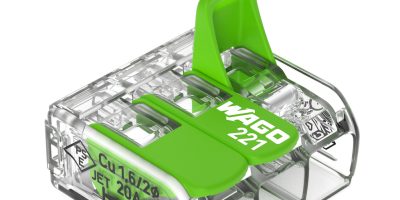Wago recycles plastics for splicing connector levers
Wago has introduced its first splicing connector with plastic components from recycled and bio-based residues. The Wago 221-42x is made from recycled and bio-based residues from industry and households.
It demonstrates the resource-efficient use of materials for sustainability and safety-sensitive products, said Wago.
The splicing connector with green levers has the same advantages and features as its counterpart with orange levers but consists partly of origin-certified, bio-circular (based on bio-based residues from industry and households) and recycled plastics (post-consumer recycled material). The connector range minimises reliance on fossil resources and keeps plastics in circulation. The lever (PBT) consists of at least 27 per cent reused PET bottles. Up to 77 per cent of the housing is based on bio-based residues from industry and households, such as tall oil, used fat and residues from the production of edible oils, which are processed into high quality polycarbonate.
The packaging is grass paper which is 30 per cent grass fibre and 70 per cent recycled paper which saves 5.6 per cent CO2 equivalent and 11 per cent water in production compared to pure recycled paper production. It also has 28 per cent lower impact on biodiversity as the grass fibre comes from cut grass which is legally mowed one to three times per year to compensate for lost farmland.
The Wago Group is an international, standard-setting supplier of electrical interconnection, automation and electronic interface products. The family-run company specialises in spring pressure connection technology. It was founded in 1951 and has headquarters in Minden, Germany.




